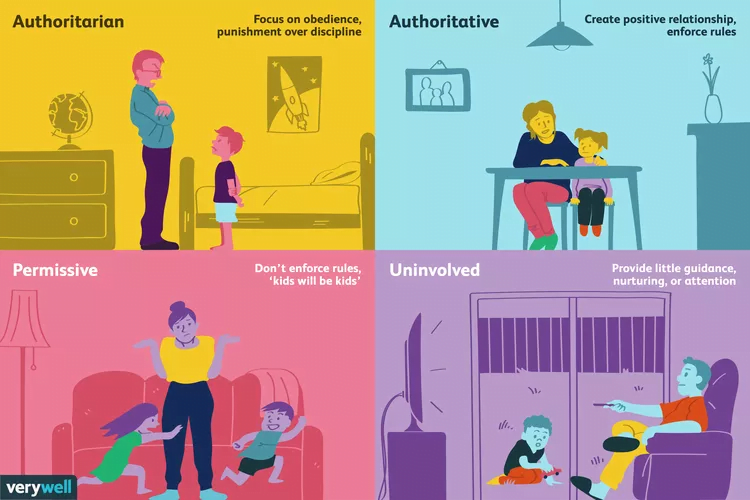
When it comes to raising kids, we all have our own unique parenting style. While all parents have different approaches to raising their children, it can be beneficial to know which parenting style you may have, as it can give you insight into your own parenting practices and how it’s impacting your child’s development.
Knowing your parenting style can also help you make changes to improve things. In this post, let’s check out the different parenting approaches and the one that is most encouraged in modern America.

The Different Types of Parenting Styles
Obviously, there’s no one-size-fits-all approach to parenting, and different styles can have a big impact on your kid’s development. Below I will list all the four common parenting styles that are all unique in their own way and have a different approach to parenting. Understanding these styles can help you reflect on your own parenting practices and determine the best way to support your child’s growth and development. Some of these styles tend to be more effective in promoting positive outcomes in children compared to others.
It’s important to note that different kids might respond better to different styles, and it’s also okay to switch things up as you learn and grow as a parent. The most important thing is to strive to be the best parent you can be!
The 4 common parenting styles
There are several different parenting styles that have been identified in modern society. The four most commonly recognized styles are:

- Authoritarian: This style is characterized by high levels of control and strict rules. Parents who use this style tend to be very demanding and have little tolerance for deviation from their rules. In general, authoritarian is heavy on the rules and discipline, and lacks warmth and responsiveness.
- Permissive: This style is characterized by low levels of control and few rules. Parents who use this style tend to be very lenient and allow their children to make their own decisions. This style is more hands-off and indulgent, with few rules and lots of love and warmth.
- Authoritative: This style is characterized by a balance of control and freedom. Parents who use this style set firm limits for their children, but also encourage independence and self-regulation. In short, it is all about setting clear rules and boundaries, but also being responsive and warm.
- Uninvolved: This style is characterized by a lack of responsiveness and involvement, and little interest in the child’s life. Parents who use this style tend to be emotionally distant and provide little guidance or support for their children.
How to identify your parenting style?

Knowing your parenting style can be super helpful in making sure you and your partner (if you have one) are on the same page and can work together to give your kids the best upbringing possible. It can also help you understand your child’s personality and how you can tweak your style to support them in the best way possible.
There are a few ways to identify your parenting style:
- Self-reflection: You can take some time to reflect on your own parenting practices and beliefs. Think about how you respond to your child’s behavior, what you value in your parenting, and how you approach discipline and decision-making.
- Online quizzes and assessments: There are a variety of online quizzes and assessments available that can help you identify your parenting style. These quizzes often ask questions about your attitudes and beliefs about parenting, as well as how you respond to different situations.
- Professional assessment: Another way to identify your parenting style is by working with a professional, such as a therapist or counselor who specializes in family therapy. They can help you understand your style by observing you interacting with your child, and providing feedback and guidance on how to improve your parenting style.
- Observing others: You can also observe other parents and compare their parenting styles to yours. It’s not a definitive way to identify your style but it can help you to reflect on your own parenting practices and beliefs.
Ultimately, it’s important to remember that parenting styles are not absolute and can change over time. Therefore, it’s helpful to re-evaluate your style periodically and make adjustments as needed to best support your child’s growth and well-being.
Which Parenting Style Is Most Encouraged In Modern America?
The Authoritative Parenting is generally considered the most encouraged and effective in modern America. This style is characterized by a balance of control and freedom, with parents setting clear rules and boundaries while also being responsive to their children’s needs and encouraging their autonomy and independence.
The benefits of Authoritative Parenting
Studies show that kids raised by authoritative parents tend to have higher self-esteem, better social skills, and better academic performance. Plus, they learn to be self-reliant and handle their emotions better. Additionally, children raised by authoritative parents tend to be more self-reliant and have a greater ability to regulate their own emotions.
It’s easy to see why this parenting style has become so popular in modern America. It encourages children to be independent thinkers while still giving them guidelines to follow. It teaches children how to make decisions on their own while also allowing them to express their emotions in a safe and healthy way.
The authoritative approach gives parents the opportunity to shape their children’s personalities by setting an example of what they should aspire to be. It is also associated with fewer behavior problems, lower rates of substance abuse, and better mental health.
The downsides of Authoritative Parenting

So as mentioned earlier, authoritative parenting is the popular choice these days in modern America, but it does have some potential downsides if not applied flexibly and appropriately to each child’s need and each situation.
One potential downside of this style is that it can be demanding and time-consuming for parents. You gotta set clear rules and boundaries, keep an eye on your kids’ behavior, and always be there for them, which can be a lot of work. Luckily, there are plenty of resources available to help, such as parenting style quizzes and helpful tips from experts. With dedication and determination, any parent can incorporate authoritative parenting into their family life and start seeing positive results.
Another potential downside is that children raised by authoritative parents may feel a lot of stress and pressure, especially when it comes to academics and extracurricular achievement. This is because authoritative parents often have high expectations for their children and may push them to achieve academically, which can lead to stress and burnout.
Additionally, some children may find the high expectations of authoritative parents to be overwhelming, and may become resistant to the rules and boundaries set by the parents, which can lead to conflicts and power struggles.
So here is the thing, every child is different and will react differently to different parenting styles. Plus, what works in one culture may not work in another, so it’s important to consider the social and cultural context, too. The bottom line is, it’s all about finding what works best for you, your partner (if you have one), and your kids.
Some tips for parents who want to practice Authoritative Parenting
Here are some tips for parents who want to practice the authoritative parenting:

- Set clear rules and boundaries: Establish clear expectations for your child’s behavior and consistently enforce them. Make sure your child understands the consequences of breaking the rules.
- Encourage independence and autonomy: Allow your child to make age-appropriate decisions and take responsibility for their actions. Provide opportunities for your child to learn and grow through new experiences.
- Communicate effectively: Listen actively to your child and encourage open and honest communication. Be willing to see things from their perspective and validate their feelings. There are a variety of activities to strengthen the bonding and hence, communication with your children.
RELATED POST: Making the Best of Your Time: Parent-Child Bonding Tips
- Show affection and provide emotional support: Show your child that you love and care for them by being affectionate and providing emotional support. Create a warm and nurturing environment for your child to grow and develop.
- Be consistent: Follow through with the rules and consequences you set. Consistency is key when it comes to authoritative parenting.
- Be flexible: Be willing to adjust your parenting style as your child grows and develops. Recognize that what works at one stage of development may not be appropriate at another stage.
- Seek professional help if needed: If you find that your child is struggling and you’re not sure how to best support them, consider seeking professional help. A therapist or counselor can help you understand your child’s needs and develop a parenting plan that works for both of you.
Remember, parenting is all about learning and growing, so don’t beat yourself up if you make mistakes. The most important thing is that you’re trying your best to be the best parent you can be for your kid.
In summary, it’s worth mentioning that there is no single “perfect” parenting style, and what works well for one child or family may not be the best approach for another. But, understanding your style can help you become more self-aware and make conscious decisions about how to parent your child in a way that supports their growth and well-being. In general, the authoritative parenting is often seen as a good starting point for parents to strive for.